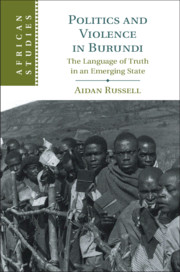Book contents
- Politics and Violence in Burundi
- African Studies Series
- Politics and Violence in Burundi
- Copyright page
- Contents
- Figures and Maps
- Acknowledgements
- Linguistic and Orthographic Note
- Glossary of Terms
- List of Abbreviations
- Introduction
- Prologue, 1796–1959
- Part I 1959–1961: ‘To See the Son of a King’
- Part II 1961–1967: ‘A Most Total Anarchy’
- Part III 1968–1972: ‘Please Send Me a Car to Take Them Away’
- 5 Politiques bw’insaku
- 6 Couper tout ce qui dépasse
- Conclusion
- Bibliography
- Index
- African Studies Series
5 - Politiques bw’insaku
Talking Vigilance
from Part III - 1968–1972: ‘Please Send Me a Car to Take Them Away’
Published online by Cambridge University Press: 03 October 2019
- Politics and Violence in Burundi
- African Studies Series
- Politics and Violence in Burundi
- Copyright page
- Contents
- Figures and Maps
- Acknowledgements
- Linguistic and Orthographic Note
- Glossary of Terms
- List of Abbreviations
- Introduction
- Prologue, 1796–1959
- Part I 1959–1961: ‘To See the Son of a King’
- Part II 1961–1967: ‘A Most Total Anarchy’
- Part III 1968–1972: ‘Please Send Me a Car to Take Them Away’
- 5 Politiques bw’insaku
- 6 Couper tout ce qui dépasse
- Conclusion
- Bibliography
- Index
- African Studies Series
Summary
This chapter presents the early years of the First Republic through the search for new terms of popular political inclusion and control, and through the internal suspicions and rivalries among the elite. After initial hostility and caution towards the new regime, the borderland population seemed to embrace the new ideology of ‘vigilance’ and the new party youth league, the JRR. Particularly suited to a border location, these modes of vigilance entailed the performance of absolute loyalty, and seemed to manifest the realisation of the state’s official truth, but also permitted some flexibility and protection for local communities by concealing their deviances and contradictions. The state, however, succombed to the ‘politics of gossip’, in which vigilance drove fatal feuds and accusations towards ethnic ideologies and paranoia. Presenting the emergence of the ‘Groupe de Bururi’ as a political faction and the farce of a treason trial that examplified the total subversion of truth among the elite, the chapter observes the drifting ‘zombification’ between an apparently loyal citizenry and the self-obsessed elite, beneath the deceiving truth of vigilance as a new mode of citizenship.
- Type
- Chapter
- Information
- Politics and Violence in BurundiThe Language of Truth in an Emerging State, pp. 197 - 226Publisher: Cambridge University PressPrint publication year: 2019

